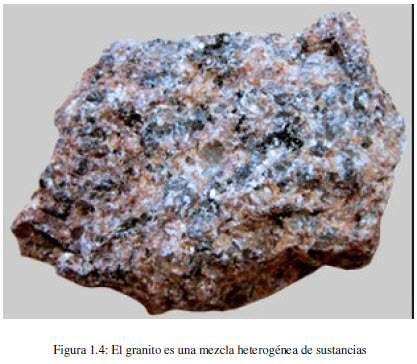 Mixtures are combinations of pure substances. Each substance retains its physical and chemical properties in the mixture. For example, if we put 50 ml of methanol and 50 ml of water in a glass, a mixture is obtained, in which both methanol and water retain their properties.
Mixtures are combinations of pure substances. Each substance retains its physical and chemical properties in the mixture. For example, if we put 50 ml of methanol and 50 ml of water in a glass, a mixture is obtained, in which both methanol and water retain their properties.When the properties of a mixture do not vary from one point to another, it is called homogeneous . In heterogeneous mixtures the properties change as we move through the solution. The ethanol-water mixture is homogeneous, the air formed by nitrogen, oxygen, carbon dioxide and water vapor is another example of a homogeneous mixture.
The mixture of common salt and sucrose (table sugar) solids is heterogeneous. As we move through the mixture we find sucrose at some points and salt at others.
The substances that form a mixture can be separated by physical methods, such as: distillation, extraction, crystallization, methods that are based on magnetic properties of the substances, ect.
Thus, a heterogeneous mixture of iron and sulfur can be separated with a magnet, based on the magnetic properties of iron. The result of separating a mixture is obtaining pure substances, pure iron and pure sulfur.
The homogeneous mixture of water and methanol can be separated based on the different boiling points of both components. This separation technique is known as distillation. The result is obtaining both substances that form the separate mixture.
Definition of mixture: "combination of two or more pure substances, in which the composition can be varied and each substance retains all its properties"
By separating a mixture, the substances that form it are obtained. Therefore, a substance cannot be separated into other simpler ones by any physical method.
Definition of substance: "all matter that is not separable into simpler components by physical methods"
Water is a substance and no physical process is capable of converting it into simpler substances. There are chemical methods that can decompose water into its constituent elements, but the definition of a substance only takes physical methods into account. Oxygen, nitrogen, sulfur, iron, common salt, sucrose, glucose, are also substances.
A compound is any substance that can be broken down into simpler substances by chemical means. Water is a substance since it can be broken down into oxygen and nitrogen by electrolysis. However, nitrogen and oxygen are not compounds since they cannot be broken down into simpler substances by chemical processes. What are these substances that cannot be broken down called? The answer is chemical element.
Definition of compound: "any substance that cannot be decomposed by physical methods into other simpler ones."
Definition of element: "all substances that cannot be decomposed into simpler ones by chemical methods"



